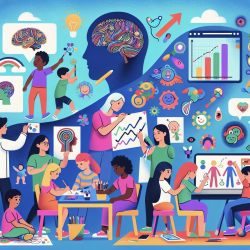In the realm of speech-language pathology, creating data-driven, effective interventions for children with Social, Emotional, and Behavioral Difficulties (SEBD) is paramount. The research article "Can developmental cognitive neuroscience inform intervention for social, emotional and behavioural difficulties (SEBD)?" by Frederickson et al. (2013) provides critical insights that can guide practitioners in refining their approaches.
According to the study, leveraging developmental cognitive neuroscience can significantly enhance the effectiveness of interventions for children with SEBD. The research emphasizes the importance of understanding the neurocognitive profiles of children, particularly those exhibiting callous-unemotional (CU) traits, to tailor interventions more precisely.
Key Findings and Implementation Strategies
The study implemented the "Let's Get Smart" (LGS) program, a neuroscience-informed intervention, in a school setting. Here are some key takeaways and actionable strategies:
- Neurocognitive Profiling: Assessing children for CU traits and other neurocognitive profiles can help in customizing interventions. For instance, children with high CU traits benefit more from reward-based strategies rather than sanctions.
- Behavioral Strategies: The LGS program utilized specific tools like emotion thermometers, quiet time, and thought-behavior chains. These tools help children self-regulate and understand the consequences of their actions.
- Executive Function Training: Enhancing executive functions such as inhibition, working memory, and flexibility is crucial. The study showed significant improvements in these areas, correlating with better behavioral outcomes.
- Immediate Rewards and Removal of Sanctions: Transitioning from long-term reward systems to immediate rewards can increase motivation and reduce negative behaviors. The LGS program found success in providing session-based rewards tailored to each child's interests.
Implementing these strategies requires a commitment to continuous evaluation and adaptation. The mixed-methods design of the study, which included both qualitative and quantitative assessments, underscores the importance of ongoing monitoring to ensure the interventions remain effective.
Encouraging Further Research
While the results of this pilot study are promising, they also highlight the need for further research. Future studies should consider larger sample sizes, diverse school settings, and longitudinal data to validate and expand upon these findings. Additionally, incorporating measures of brain structure and activity could provide deeper insights into the neurobiological underpinnings of SEBD and the effectiveness of neuroscience-informed interventions.
For practitioners, staying abreast of the latest research and continuously refining their approaches based on empirical evidence is crucial. Engaging in professional development opportunities and collaborating with researchers can enhance the quality of interventions and ultimately improve outcomes for children with SEBD.
To read the original research paper, please follow this link: Can developmental cognitive neuroscience inform intervention for social, emotional and behavioural difficulties (SEBD)?










